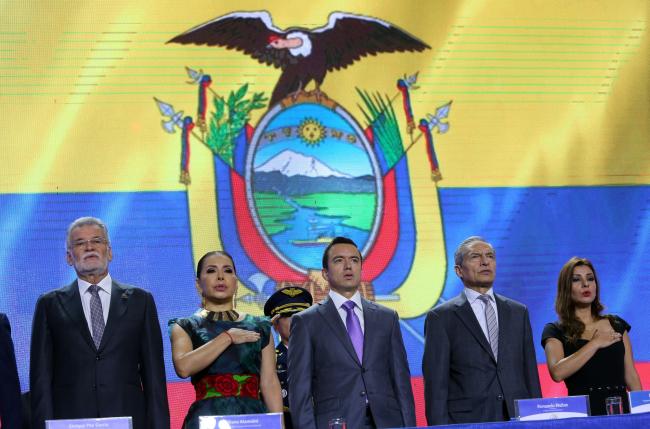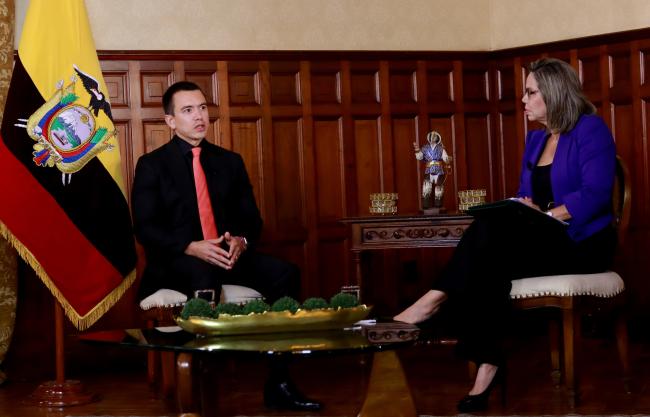
This article was originally published in Spanish by Nueva Sociedad.
On Sunday, April 21, 2024, the referendum called by President Daniel Noboa obtained mixed results. In a fairly homogeneous way throughout the country, Ecuadorians approved the referendum's nine questions on security. They rejected the two measures on the economy: the legalization of contract work by the hour and the enshrining in the constitution of international arbitration to settle disputes over investment, trade, and debt.
In anticipation of the results, the day before the vote the government issued a statement blaming one of its allied parties—the Construye movement, led by María Paula Romo, minister of government under former president Lenín Moreno—for including the question on hourly contracting. This was the most controversial piece of the constitutional reform package, and an initiative that Noboa himself had rejected during his campaign. Although the government could not disguise the fact that the referendum was called exclusively for electoral purposes, with a view to the February 2025 elections, it is difficult to interpret the results as unconditional support for the government.
Noboa did receive an endorsement of his security agenda. It is clear that the electorate trusts that longer prison sentences, the Army's continued participation in the fight against organized crime, and limits to constitutional guarantees for detainees will contribute decisively to restoring some calm in the streets, afflicted by an unprecedented increase in criminal violence in the last three years. In this context, and in the midst of a much-publicized fiscal crisis, the government decided to prioritize an expenditure of more than $60 million for a referendum, called outside the regular electoral calendar, to approve new legal tools to fight crime. The vote endorsed the diagnosis and promises offered by Noboa, son of banana magnate Álvaro Noboa and who became president in November 2023 following Guillermo Lasso's early exit from office. It is perfectly clear that the central problem is not weak punishments, but impunity. Criminals do not go free after serving sentences that are too short; they are never apprehended. Still, the iron fist narrative, with a certain aesthetic borrowed from El Salvador’s Nayib Bukele, has taken hold of public opinion.
The underlying problem is that homicide figures have not significantly decreased. Two mayors of mining areas in the south of the country were assassinated on the eve of the referendum. The decisive detail is that, during this entire security crisis since February 2021, 15 states of exception have been decreed. In other words, the military has been on the streets alongside the police for three years in a virtually uninterrupted manner—just what the popular referendum seeks to facilitate. Measures in the referendum such as authorizing state forces to use weapons and munitions confiscated from criminal groups or criminalizing the possession of weapons reserved for law enforcement use—something already in the legislation—do not sound like particularly imaginative proposals for combatting organized crime.
Based on its diagnosis of the problem and promise of pacification, the government maintains high levels of social support. The reason is found, in large part, in what happened in January of this year. The government's entire image is marked by the events of January 9, 2024, when there was an unprecedented spike in criminal violence: simultaneous takeovers of six prisons the day before, a dozen handmade car bombs in eight provinces, kidnappings of police officers, and the takeover of a public television channel by a group of teenagers linked to organized crime. In the face of the social disruption, the government decreed an "internal armed conflict" to combat 22 organized crime groups, which produced a momentary drop in violence in the streets. The reason for this reduction probably lies in a strategy of withdrawal on the part of the main criminal gangs after the incidents of January 8 and 9, which facilitated the escape of two leaders from two prisons, one in Riobamba, the other in Guayaquil: Fabión Colón Pico, leader of Los Lobos, recently recaptured, and Adolfo Macías, alias Fito, the leader of Los Choneros, linked to the Sinaloa Cartel.

Emboldened by this ephemeral success, the government has dedicated itself to multiplying the dramatic effects. The biggest move—and the one with the most profound consequences—was the police invasion of the Mexican Embassy to arrest Jorge Glas Espinel, former vice president under presidents Rafael Correa and Lenín Moreno. Glas, convicted of receiving $18 million in bribes from the Brazilian firm Odebrecht, had taken refuge in the embassy. In addition to causing a diplomatic embarrassment of planetary proportions, the Mexican Embassy operation ruptured the political alliance that the government maintained with Correa's allies in the parliament. Noboa decided he no longer needed Revolución Ciudadana, the political movement of former president Correa, who lives in exile in Belgium.
The main laws promoted by the conservative government have already been approved—sometimes by resorting to Correísta votes, sometimes without them, as when the government obtained approval of the trade agreement with China. When it comes to the embassy invasion, it is likely that among the government's calculations behind carrying out such an obtuse violation of one of the most respected rules of international diplomacy was the convenience of courting the anti-Correa vote by attacking the most discredited figure of that political current. The embassy incursion was an illegal act of force on the part of the young president that nevertheless gained him popularity at home.
Another bombshell occurred more recently, when, after three months of inoperativeness, slowness, and unpredictability, the country was once again subjected to electric power rationing—this time, without prior warning and with the government using the euphemism of "disconnection" instead of a cut in electricity. Immediately, Noboa dismissed his minister of energy, Andrea Arrobo, accusing her of sabotage, and lawmakers moved to launch impeachment proceedings against Arrobo and 21 other energy sector officials. One of Noboa's most authoritative spokespersons went so far as to claim that the floodgates of the Mazar dam, in the south of the country, had been deliberately opened to empty it and impede operation. The dam has no floodgates. This bravado replicated in the local sphere the spectacle earned in the international arena.
Without practical results on security issues, where Noboa currently has greatest popular support, his economic austerity agenda—which includes an agreement with the International Monetary Fund and has garnered ostensibly less support—is likely to falter. Time is running against Noboa. But the atmosphere of insecurity, fear, and desperation favor the pursuit of order at any cost. The political right has always been the standard bearer of order; the left has always been uncomfortable with its demands. At the same time, the Ecuadorian electorate has just confirmed that it is far from adhering to the economic project advocated by its business elites, just as one year ago it rejected the extractivist project in the Yasuní National Park.
Instead, Ecuadorans have accepted the security measures on offer by a president who was chosen only to complete Lasso’s term and who is already dreaming of the February 2025 elections. The outcome of these elections will depend, in any case, on the balance between successes and failures on issues of security and the economy.
Translated from Spanish by NACLA.
Pablo Ospina Peralta is a professor at the Universidad Andina Simón Bolívar and member of the Commission of Experience, Faith and Politics.

